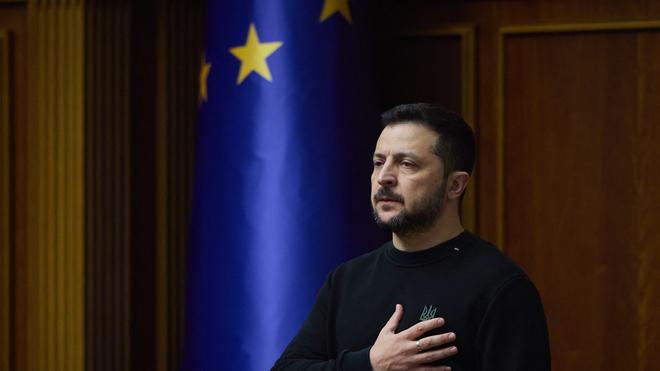Ukrainian President Volodymyr Zelensky has made a significant proposal aimed at bringing an end to the devastating conflict with Russia. In an interview with Britain’s Sky News, Zelensky urged NATO to extend guaranteed protections to parts of Ukraine still under Kyiv’s control, arguing that such a move could immediately “stop the hot stage of the war.”
This bold suggestion reflects the dire urgency to stabilise a conflict that has raged for nearly three years, devastating millions of lives and reshaping global geopolitics.
A Strategic Compromise?
Zelensky hinted at a pragmatic approach to the ongoing war. While reiterating Ukraine’s commitment to regaining all of its territories occupied by Russia—amounting to almost 18% of the nation’s internationally recognised land—he acknowledged that a phased strategy might be necessary. The president suggested prioritising NATO protections for government-held regions, ensuring their safety while diplomatically working toward reclaiming lost areas.“
If we want to stop the hot stage of the war, we should take under NATO’s umbrella the territory of Ukraine that we have under our control,” Zelensky said. He stressed the importance of ensuring that Russian forces would not be able to re-invade under any circumstances, adding, “If we speak of a ceasefire, [we need] guarantees that Putin will not come back.”
Rising Tensions Amid Escalating Attacks
Zelensky’s remarks come against the backdrop of escalating hostilities. Russia recently launched an aerial assault targeting Ukraine’s energy infrastructure, claiming it was retaliation for Ukrainian strikes on Russian territory using U.S. and British-supplied missiles. Moscow also threatened to target government buildings in Kyiv, further stoking fears of intensified violence.
These developments underscore the pressing need for international intervention. Zelensky has engaged in a flurry of diplomatic activity, holding discussions with leaders like France’s Emmanuel Macron, Germany’s Olaf Scholz, and Britain’s Keir Starmer. The U.S. has also stepped up its support for Kyiv following Donald Trump’s presidential election victory, granting Ukraine the use of long-range missiles—a decision that has sparked a fierce response from Moscow.
Challenges of NATO Involvement

While Zelensky’s proposal to bring parts of Ukraine under NATO’s security umbrella could provide immediate protection, it also poses significant challenges. Extending Article 5 collective defence measures to a country at war with a nuclear power like Russia would be unprecedented and carries immense risks. NATO member states have been cautious, balancing support for Ukraine with avoiding direct confrontation with Moscow.
Russian President Vladimir Putin has repeatedly demanded that Ukraine abandon its NATO ambitions as a precondition for peace. However, Kyiv has steadfastly refused, viewing NATO membership as essential for ensuring its long-term security.
A Ceasefire or Peace Deal?
Talks of a potential ceasefire have gained traction since Trump’s election win, with the Republican leader claiming he could end the conflict “within hours.” However, Trump has not provided details on how he plans to achieve such a resolution, leaving many sceptical. Any deal would face significant hurdles, particularly as Ukraine has ruled out ceding territory while Russia continues to demand more land withdrawals.
Strengthening Ukraine’s Defence
In response to the escalating conflict, Zelensky has made key military leadership changes, appointing Mykhailo Drapaty as the new commander of Ukraine’s Land Forces. Drapaty, known for his successful defence against surprise Russian offensives in the northeastern Kharkiv region, is expected to bolster the army’s combat readiness.“
These personnel decisions aim to strengthen our army, enhance its combat readiness, and introduce new management approaches,” Defence Minister Rustem Umerov said.
Summary
Zelensky’s proposal represents a calculated move to secure immediate protection for Ukraine while maintaining its long-term goal of reclaiming occupied territories. As the conflict intensifies, his call for NATO guarantees underscores the urgency for global action. Whether the international community can navigate the delicate balance of supporting Ukraine without provoking a broader war remains to be seen.


